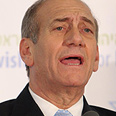
Feverish contacts have been held Friday in the UN building in New York in an attempt to agree on a draft proposal calling for a ceasefire between Hizbullah and Israel.
While cautious optimism was expressed in Lebanon, nevertheless, the Lebanese foreign minister said the draft was unacceptable to him. Meanwhile, Russia decided to submit its own draft for an immediate ceasefire.
Earlier, sources in Prime Minister Ehud Olmert’s office expressed cautious optimism early Friday regarding the possibility that the latest American diplomatic maneuver will in fact lead to a ceasefire.
The proposal will call for Hizbullah’s disarmament in accordance with UN Resolution 1559, but this will not be declared a precondition for reaching a ceasefire.
However, the proposal does require the return of the kidnapped IDF soldiers to Israel.
France retracted its demand for the withdrawal of IDF forces to the international border as a ceasefire precondition.
As a result of the deal being formulated, the IDF will gradually pull out of Lebanon and will be replaced by an international force under the auspices of the UN and with Lebanese government consent.
The international force will include 10,000 French troops, and perhaps more from Spain and other countries, who will deploy in south Lebanon along with UNIFIL and 15,000 Lebanese soldiers.
The force will deploy in a buffer zone free of Hizbullah terrorists and in Lebanon-Syria border crossings.
The international force will be tasked with preventing the smuggling of Katyusha rockets and arms from Syria and Iran to Lebanon, but it will not disarm Hizbullah.
The Security Council is expected to vote on the ceasefire plan within the next two days.
Hizbullah, for its part, announced that it would not abide by any UN Security Council decision that would not call for the withdrawal of IDF troops from Lebanon.
'International community understands'
Lebanese media said the terror group continues to back Lebanese Prime Minister Fouad Siniora’s “Seven-Point” plan.
Lebanese Foreign Minister Fawzi Salloukh said “the proposal does not coincide with Lebanon’s goals because it does not call for an immediate ceasefire and (Israeli) withdrawal. The decision also discriminates against Lebanese prisoners (due to the call for the release of the kidnapped IDF troops).”
Following talks with US Assistant Secretary of State David Welch in Jerusalem, Olmert said “at this time, a new diplomatic formula with positive implications that could end the fighting is being formulated. If it isn't accepted, Israel will take off the gloves."
Sources in the PM’s Office said the chances for a ceasefire that would meet Israel’s requirements are “50-50.”
Foreign Minister Tzipi Livni also met with Welch in a bid to formulate a ceasefire proposal that would be accepted by Israel.
However, Olmert did not authorize Livni to travel to New York, where she was scheduled to discuss the ceasefire proposal with US Secretary of State Condoleezza Rice.
A senior official at the PM’s Office said Olmert did not want any more pressure to be applied on Israel as a result of Livni’s presence in the UN.
Meanwhile the prime minister and Defense Minister Amir Peretz instructed the army to put the next phase of its ground operation in south Lebanon on hold to prevent further escalation and after the White House apparently made it clear that such a move would be detrimental to the diplomatic efforts.
However, a source in Jerusalem said “The international community understands that we cannot accept the continued rocket fire on northern Israel.”
Yitzhak Benhorin contributed to the report















